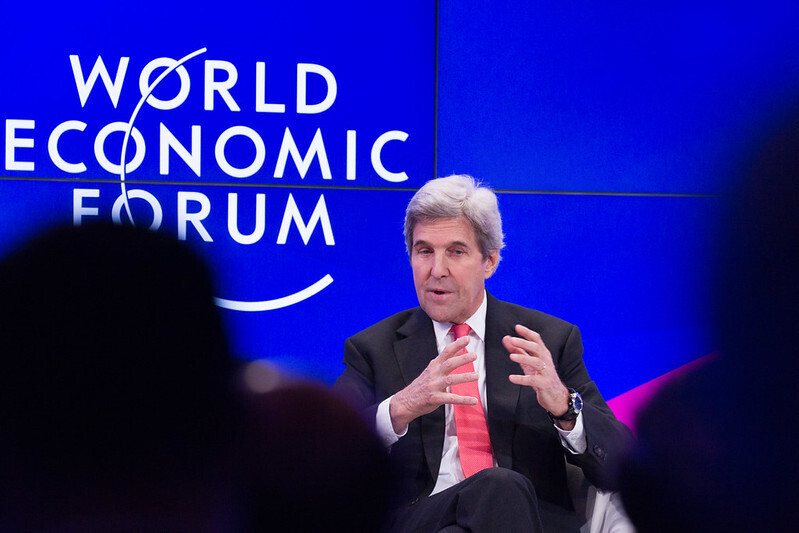Action on Energy Demand Could Boost Growth, Save Economies $2 Trillion a Year and Cut Greenhouse Gas Emissions, Say Global CEOs

|
Listen to this story:
|
Key Impact Points:
- Global CEOs Support Energy Demand Reduction: Over 120 CEOs back practical actions to reduce energy demand in buildings, industry, and transport, aiming for a 31% reduction across all sectors.
- Economic and Environmental Benefits: Implementing these measures could save economies $2 trillion annually, boosting growth, saving company costs, and cutting greenhouse gas emissions.
- Initiative by World Economic Forum: The report is part of the Forum’s International Business Council, representing 3% of global energy use.
- COP28 Pledges: Governments committed to tripling renewable energy capacity and doubling energy efficiency improvement by 2030, demanding significant private sector changes.
- Actionable Strategies: Businesses can act now on energy demand through AI optimization in factories, energy efficiency, value chain collaboration, retrofitting buildings, and electrifying transport.
- No New Technology Needed: These actions require no new technology and could avoid building 3,000 extra power stations, aligning with the Paris Agreement targets.
- Call for Collaboration: The report emphasizes the need for private-public sector collaboration and supportive regulation to drive energy demand reduction.
- Focus on Energy Demand: The International Business Council highlights the importance of addressing energy demand, often overlooked compared to supply-side solutions.
- Potential for Business Improvement: Reducing energy intensity offers a significant opportunity for business improvement and greenhouse gas reduction.
- Upcoming Discussions in Davos: The report will be a key topic at the Annual Meeting 2024, focusing on public policy and business partnerships to act on energy demand.
A set of business actions aimed at reducing the intensity of energy demand could unlock annual savings of at least $2 trillion for the global economy if measures are taken by the end of this decade. This would boost growth, save companies cash and deliver competitive advantage while also reducing emissions.
These are the findings of the World Economic Forum’s Transforming Energy Demand initiative – and a new report – launched in collaboration with PwC and supported by over 120 global CEOs who are members of the International Business Council (IBC), a group representing 3% of global energy use.
The report comes as energy demand is ramping up the international agenda. In one of the most widely supported initiatives at COP28, governments pledged to triple the world’s renewable energy capacity by 2030 and double the rate of energy efficiency improvement over the same period. Countries need to cut their energy intensity at least twice as fast between 2023 and 2030 as they did in previous years, which calls for substantial changes from the private sector.
The report highlights practical actions that businesses can take today to act on energy demand. These would be driven by energy-intensity reductions in buildings, industry and transport. Examples include energy-saving measures such as using artificial intelligence to optimize factory line design, energy efficiency, value chain collaboration, industrial clustering to share clean energy initiatives, retrofitting buildings and electrification of transport.
The report says that “the potential of this demand-side action is extraordinary” and offers a short-term, cost-efficient 31% reduction of demand, shared across all economic sectors. These gains are deliverable now, at attractive returns, needing no new technology and could avoid the construction of 3,000 extra power stations, according to estimates from the report. Such concerted action would unlock growth and productivity. At the same time, it would drive the required change in rate of energy efficiency improvement set by countries at COP28, supporting the world to get back on track to meet the targets set by the Paris Agreement.
“Policy-makers and business leaders need to collaborate to accelerate an energy transition that creates positive outcomes for people, society and the planet. The private sector can play a leading role in this transformation, which is why the International Business Council decided to focus on their businesses’ energy consumption with practical actions each organization can take today both individually and through their value chains,” said Olivier Schwab, Managing Director, World Economic Forum.
The focus on energy demand came after members of the IBC met one year ago at the Annual Meeting 2023 and saw the need for the private sector to play a leading role in driving demand-side energy transformation. Much of the debate on the energy transition and climate has focused on the supply side but demand-side actions are “doable today, at attractive returns with no need for new technology”, the report notes.
Energy-intensity reduction examples taken together represent an under-addressed area and awareness of its potential for business improvement and greenhouse gas reduction is low. Regulation and policies will also be required to drive progress coupled with public-awareness campaigns to highlight the importance of increasing energy efficiency. Some 47% of IBC CEOs surveyed in the report say there is a lack of supportive regulation for businesses to act on reducing energy demand, suggesting the need for private and public sectors to work together to drive change.
“Reducing the amount of energy needed to manufacture products and deliver services is something we can act on now. Although progress is being made, there is a lot more to be done, and the fact is that our energy demand continues to rise at unsustainable rates. Businesses have a vital role to play, and by using technology that is available and scalable today, we can reduce current energy intensity by up to a third, without decreasing output. It is crucial, therefore that we work together with governments and regulators across both developed and developing markets to help accelerate progress on this issue,” said Ana Botín, Group Executive Chair, Banco Santander and Chair of the IBC.
Related Article: Intel Vows to Reach Net-Zero Greenhouse Gas Emissions by 2040, Shaping a Greener Tech Industry
“It is crucial we address energy demand alongside supply, reducing the energy intensity of current activity and increasing the energy efficiency of future growth. This will help the world to get back on track on targets set out in the Paris Agreement, support the COP28 pledge to double the rate of energy efficiency improvements by 2030, and support business growth. Getting this right will take deep collaboration across the public and private sectors. We need to raise awareness of the business case for change, align policy and private incentives, and develop new financial solutions to unlock action,” said Bob Moritz, Global Chair, PwC.
The report will be the focus of discussions at the Annual Meeting 2024 in Davos-Klosters, where members of the IBC are meeting with leaders from government to take action on the public policy agenda and accelerate business partnerships targeted at acting on demand.












